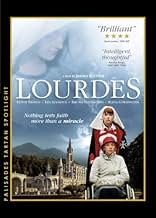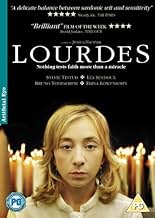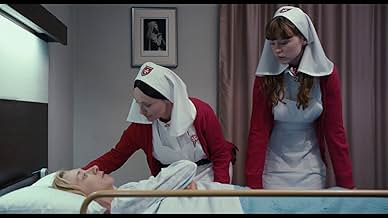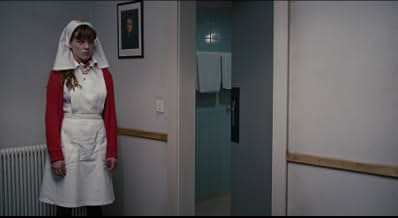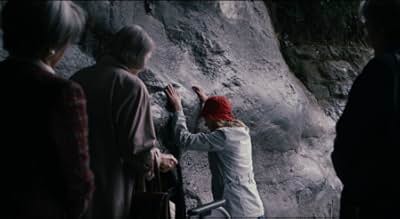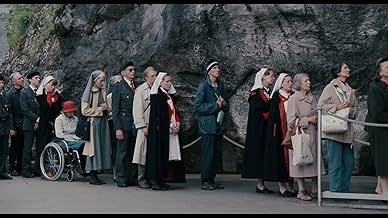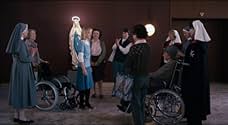IMDb RATING
6.9/10
3.9K
YOUR RATING
In order to escape her isolation, wheelchair-bound Christine makes a life changing journey to Lourdes, the iconic site of pilgrimage in the Pyrenees Mountains.In order to escape her isolation, wheelchair-bound Christine makes a life changing journey to Lourdes, the iconic site of pilgrimage in the Pyrenees Mountains.In order to escape her isolation, wheelchair-bound Christine makes a life changing journey to Lourdes, the iconic site of pilgrimage in the Pyrenees Mountains.
- Awards
- 12 wins & 7 nominations total
Orsolya Tóth
- Child in Wheelchair
- (as Orsi Tóth)
Gerith Holzinger
- Malteserin
- (as Gerith Alice Holzinger)
- Director
- Writer
- All cast & crew
- Production, box office & more at IMDbPro
Featured reviews
Christine (Sylvie Testud) is wheelchair-bound, and is suffering from multiple sclerosis. She travels to the pilgrimage site of Lourdes in the Pyrenees Mountains to both escape from her isolation, and seek some kind of answers to her situation. Compared to the other pilgrims, Christine has little faith in God. Yet while she's there, she miraculously gains controls of her limbs and she rises from her wheelchair. The church are quick to jump on it as a 'miracle', but seek medical advice in order to confirm this.
The film never takes a stance in regards to its attitude to either religion or spirituality, to the point where the 'miracle' that takes place takes a backseat. This is a film that is more concerned with its characters' plight, and how the people around Christine react to the possible miracle that they witness. It does, if anything, portray the Catholic faith in a positive light. The priest seeks all the medical advice he can get before he will believe it as a miracle, and the helpers at Lourdes (minus one rather self-involved girl) are shown to have genuine love for the work they do, and its importance. But it does also show the slightly ridiculous side, as the Church will only recognise it as an 'official' miracle if it ticks certain boxes.
it does not linger on the idea of faith, as previously stated, but instead how it corrupts, bewilders, and enchants the people around Christine. Some of the pilgrims talk bitterly between themselves and doubt her sincerity, to the point where they begin to dismiss the idea of miracles, which is the very thing that they went to Lourdes to experience. One of the male helpers initially shows an interest in Christine, glancing and smiling at her every now and then. Yet when she begins to walk again, he seems to almost completely fall for her, much to the jealousy of one of the female workers. It's a startling commentary on how humanity can be corrupted and influenced by the idea of religion.
Lourdes is a quiet, gentle and ponderous portrayal of a woman desperately seeking an answer to her illness and finding it in the last place she would expect. It doesn't force its ideas down your throat, but instead it lets it flow across the small interactions and expressions of its characters. The pace may sometimes come to a standstill, but this is a richly rewarding experience from one of Austria's most exciting new directors.
www.the-wrath-of-blog.blogspot.com
The film never takes a stance in regards to its attitude to either religion or spirituality, to the point where the 'miracle' that takes place takes a backseat. This is a film that is more concerned with its characters' plight, and how the people around Christine react to the possible miracle that they witness. It does, if anything, portray the Catholic faith in a positive light. The priest seeks all the medical advice he can get before he will believe it as a miracle, and the helpers at Lourdes (minus one rather self-involved girl) are shown to have genuine love for the work they do, and its importance. But it does also show the slightly ridiculous side, as the Church will only recognise it as an 'official' miracle if it ticks certain boxes.
it does not linger on the idea of faith, as previously stated, but instead how it corrupts, bewilders, and enchants the people around Christine. Some of the pilgrims talk bitterly between themselves and doubt her sincerity, to the point where they begin to dismiss the idea of miracles, which is the very thing that they went to Lourdes to experience. One of the male helpers initially shows an interest in Christine, glancing and smiling at her every now and then. Yet when she begins to walk again, he seems to almost completely fall for her, much to the jealousy of one of the female workers. It's a startling commentary on how humanity can be corrupted and influenced by the idea of religion.
Lourdes is a quiet, gentle and ponderous portrayal of a woman desperately seeking an answer to her illness and finding it in the last place she would expect. It doesn't force its ideas down your throat, but instead it lets it flow across the small interactions and expressions of its characters. The pace may sometimes come to a standstill, but this is a richly rewarding experience from one of Austria's most exciting new directors.
www.the-wrath-of-blog.blogspot.com
Forgive my ignorance of neither Lourdes or theology, without a Catholic background, to me the miracles sound hyperbolic and outlandish at first, but after watching the film, even though being an agnostic, some kind of insight surfaced upon my mind's eye that the miracle itself could be a fatal burden to whom it is granted, which is my very direct response, which I am not sure would be the prime aim of the director, for me, it does pique my curiosity definitely.
Due to the fact that the mystery has still been in a moot beyond any explanation by now, the third feature from Austrian director Jessica Hausner (whose previous film is a haunting ghost story - HOTEL 2004) cannily digresses the mythological topic of the epiphanic moment, instead, the film focuses directly on the individuals of the pilgrim group (thought from a restrained distance), the most noteworthy comes from their blunt reactions before/after the miraculous event, which unavoidably compass piety, expectation, sympathy versus selfishness, jealousy, gloating, envy and bitterness. As a matter of fact it is more like a discreet dissertation on a test of humanity, which literally and cruelly reveals the inconvenient truth that it is our soul needs to be cured.
What I truly commend here is the laconic shots, the full-blown palette and a calm stance which is pervasive throughout the entire movie,
all of which establish a sincere austerity and mercy to its views, plus the non-intrusion composition drastically enhances the solemnity and sacrality of its proposition
The female protagonist Sylvie Testud's performance is extraordinarily astute, despite of her word-deficient and gesture-limited role while the supporting group is also tellingly awesome, terse but impressive!
Due to the fact that the mystery has still been in a moot beyond any explanation by now, the third feature from Austrian director Jessica Hausner (whose previous film is a haunting ghost story - HOTEL 2004) cannily digresses the mythological topic of the epiphanic moment, instead, the film focuses directly on the individuals of the pilgrim group (thought from a restrained distance), the most noteworthy comes from their blunt reactions before/after the miraculous event, which unavoidably compass piety, expectation, sympathy versus selfishness, jealousy, gloating, envy and bitterness. As a matter of fact it is more like a discreet dissertation on a test of humanity, which literally and cruelly reveals the inconvenient truth that it is our soul needs to be cured.
What I truly commend here is the laconic shots, the full-blown palette and a calm stance which is pervasive throughout the entire movie,
all of which establish a sincere austerity and mercy to its views, plus the non-intrusion composition drastically enhances the solemnity and sacrality of its proposition
The female protagonist Sylvie Testud's performance is extraordinarily astute, despite of her word-deficient and gesture-limited role while the supporting group is also tellingly awesome, terse but impressive!
Kinda like reading "Magic Mtn"; a long, sometimes dull, but ultimately worthwhile tour through institutional hell, the institutions in question, medicine in the Mann novel and the church in Jessica Hausner's film, made all the more horrendous in that they masquerade as "healing". Film loses a bit of energy, though, to say nothing of credibility, once Christine experiences her temporary "cure". At that point Hausner abandons her heretofore effective tone of serio comic reality for one of allegory and kind of allows her hatred of humanity to overwhelm her. Still, a most impressive film from a director whose work has up to now been unknown to me and whose other movies I will assiduously seek. Give it a B plus.
Summary
Lourdes is a remarkable psychological and social x-ray of the world around the famous religious complex in the Pyrenees, with that clinical precision so typical of Austrian cinema and with a delicate balance in which hints of irony always give way to respect and piety. The film achieves moments of an absolutely human, moving religiosity, such as I have rarely seen in a film.
Review:
Jessica Hausner's film follows Christine, a motor disabled person, during her journey through the famous tourist-religious complex around the Lourdes Grotto in the French Pyrenees.
Multiple dimensions and themes run through this film. On the one hand, there is a look at the disease, the relationship between the healthy and the sick and how she considers the Catholic religion to the sick and the concept of healing, put into the mouths of their own priests.
On the other hand, Lourdes paints a picture of that touristic-religious universe viewed with that clinical precision so typical of Austrian cinema, with a delicate balance in which hints of irony always give way to respect and piety. It is difficult at first to place oneself in that world of patients, companions, relatives, nuns, priests and volunteers of the Order of Malta (where each one fulfills a precise, transitory or permanent function), where a sociogram is drawn where solidarity intersects , misgivings, hope, desire, jealousy, envy, frustration and, of course, faith, in a setting that is enriched with real shots of masses and mass movements in which the film leans into the documentary . They all follow a kind of procession (with something of a way of the cross) scheduled and methodical, waiting for the miracle of healing to take place.
Why do the sick go to Lourdes? Christine answers that question early in the film, and not exactly from a pious place. Sylvie Testud remarkably puts the body to her character and her evolution, accompanied by Maria (Lea Seydoux, in a rather small role), the companion who embodies health.
As we had already seen in the also notable Little Joe, Hausner beautifully frames her scenes preferably in fixed and geometric planes. Supported by a wonderful use of Bach's music, Lourdes achieves moments of an absolutely human, moving religiosity, such as I have rarely seen in a film.
Lourdes is a remarkable psychological and social x-ray of the world around the famous religious complex in the Pyrenees, with that clinical precision so typical of Austrian cinema and with a delicate balance in which hints of irony always give way to respect and piety. The film achieves moments of an absolutely human, moving religiosity, such as I have rarely seen in a film.
Review:
Jessica Hausner's film follows Christine, a motor disabled person, during her journey through the famous tourist-religious complex around the Lourdes Grotto in the French Pyrenees.
Multiple dimensions and themes run through this film. On the one hand, there is a look at the disease, the relationship between the healthy and the sick and how she considers the Catholic religion to the sick and the concept of healing, put into the mouths of their own priests.
On the other hand, Lourdes paints a picture of that touristic-religious universe viewed with that clinical precision so typical of Austrian cinema, with a delicate balance in which hints of irony always give way to respect and piety. It is difficult at first to place oneself in that world of patients, companions, relatives, nuns, priests and volunteers of the Order of Malta (where each one fulfills a precise, transitory or permanent function), where a sociogram is drawn where solidarity intersects , misgivings, hope, desire, jealousy, envy, frustration and, of course, faith, in a setting that is enriched with real shots of masses and mass movements in which the film leans into the documentary . They all follow a kind of procession (with something of a way of the cross) scheduled and methodical, waiting for the miracle of healing to take place.
Why do the sick go to Lourdes? Christine answers that question early in the film, and not exactly from a pious place. Sylvie Testud remarkably puts the body to her character and her evolution, accompanied by Maria (Lea Seydoux, in a rather small role), the companion who embodies health.
As we had already seen in the also notable Little Joe, Hausner beautifully frames her scenes preferably in fixed and geometric planes. Supported by a wonderful use of Bach's music, Lourdes achieves moments of an absolutely human, moving religiosity, such as I have rarely seen in a film.
A girl with MS can't move her body, except for the face muscles. She goes to Lourdes, the place of miracles. She's not just tired of her life, she's of course also envious about life of others.
Usually, it's obvious there on the screen you shall look. Not here. Long takes, many extras, everybody make their moves and everybody is interesting, although you may forget them for a while, watching others.
Quietly, so many believable emotions are to be found here. Jealousy, slight passion, hopes, disappointments. And after a while you're not watching, you're among these pilgrims, and although you've never been in this environment, you recognize everything. And Sylvie Testud is superb.
Usually, it's obvious there on the screen you shall look. Not here. Long takes, many extras, everybody make their moves and everybody is interesting, although you may forget them for a while, watching others.
Quietly, so many believable emotions are to be found here. Jealousy, slight passion, hopes, disappointments. And after a while you're not watching, you're among these pilgrims, and although you've never been in this environment, you recognize everything. And Sylvie Testud is superb.
Did you know
- TriviaWhen the script for Lourdes (2009) first landed on Sylvie Testud's desk, her initial reaction was that she didn't want to do anything that might involve her playing a nun or taking easy potshots at religion. She instantly changed her mind after reading the script.
- ConnectionsFeatured in Women Make Film: A New Road Movie Through Cinema (2018)
- How long is Lourdes?Powered by Alexa
Details
- Release date
- Countries of origin
- Official sites
- Language
- Also known as
- 奇蹟度假村
- Filming locations
- Production companies
- See more company credits at IMDbPro
Box office
- Budget
- €2,000,000 (estimated)
- Gross worldwide
- $2,947,270
- Runtime1 hour 36 minutes
- Color
- Sound mix
- Aspect ratio
- 1.85 : 1
Contribute to this page
Suggest an edit or add missing content


